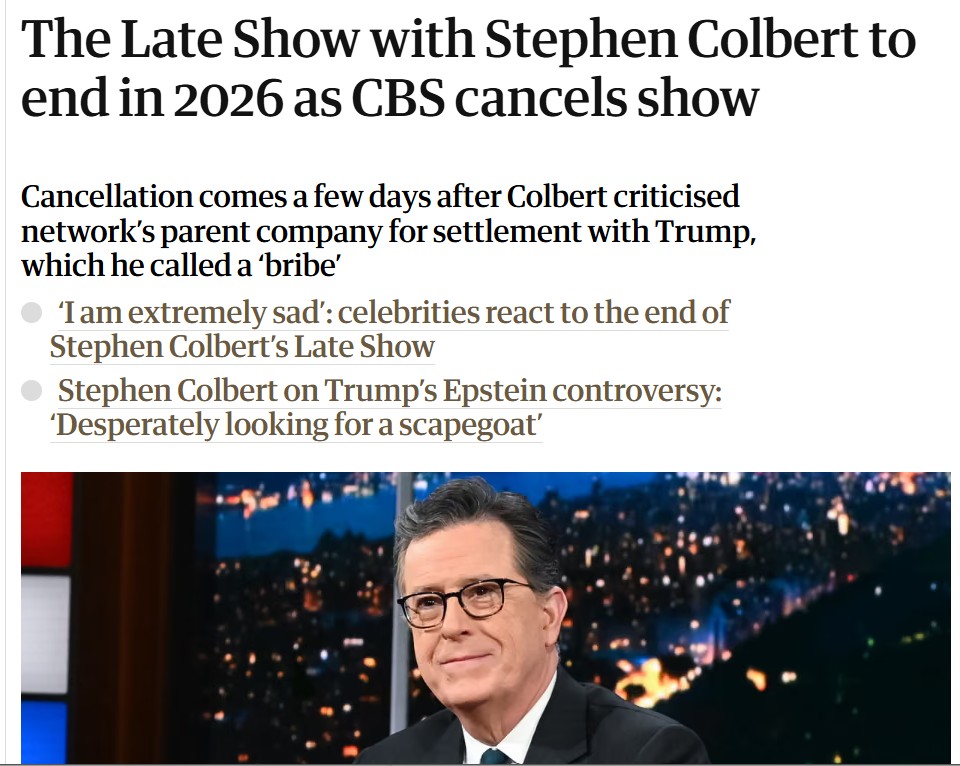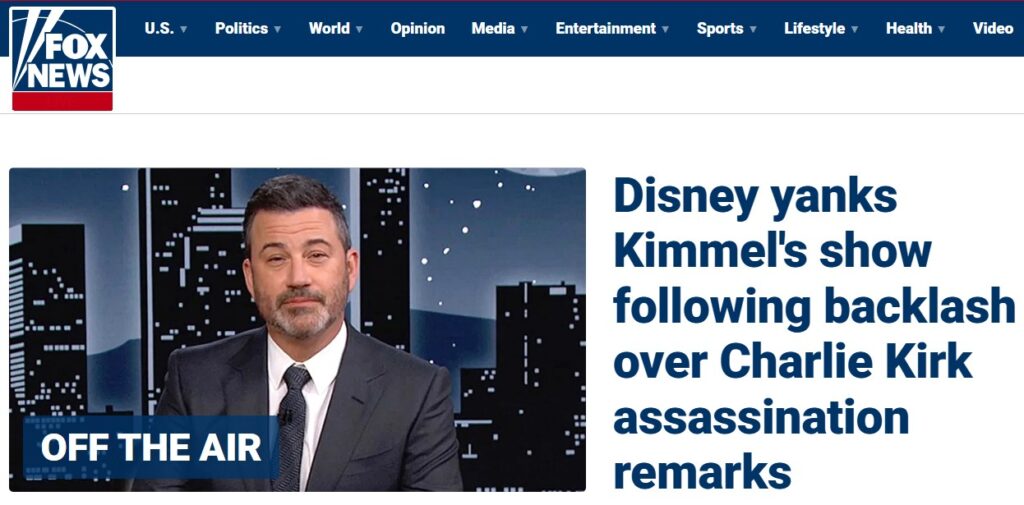FCC Weaponization
ABUSE OF POWER
Have Trump/Republicans weaponized the Federal Communications Commission?
Back Story: Colbert
Colbert called a $16 million settlement between CBS and the Trump Administration a “big fat bribe” in his opening monologue. The network agreed to the settlement after the White House filed a lawsuit over a “60 Minutes” episode with Harris, claiming the interview was deceptively edited.
Stephen Colbert announced in July that CBS (which is owned by Paramount) will be canceling “The Late Show” in May 2026, more than 10 years after he took over as host.
Then, days after the cancellation announcement, the U.S. Federal Communications Commission approved an $8 billion deal, which merged Paramount Global with Skydance Media.
SOURCE: https://www.today.com/popculture/tv/why-was-the-late-show-stephen-colbert-canceled-rcna224144
Back story: Kimmel
In August, Nexstar, the largest owner of local TV stations, announced that it wanted to purchase its rival TEGNA. This would need the approval of the FCC and require them to lift a cap on the number of stations any company could own and control. Earlier this year, the FCC chairman indicated that he might favor this purchase.
Recently, the FCC chairman (Brendan Carr), appearing on a MAGA podcast, expressed opposition to the Jimmy Kimmel show. After Kimmel criticized the right-wing response to the Kirk killing, Nexstar quickly announced that it would cancel the Kimmel shows on its ABC stations. ABC (owned by Disney) promptly announced that it was suspending the Kimmel show.
SOURCE: https://www.facebook.com/reel/1689127415111563
FCC commissioner on this- https://www.facebook.com/reel/810544268231906
Brendan Carr and Project 2025 – https://www.bloomberg.com/news/newsletters/2025-02-28/how-fcc-chairman-carr-was-cleared-by-ethics-to-write-for-project-2025

Backstory: Paramount
Paramount filed with the FCC to approve a merger with Skydance.
Trump sued Paramount, which owns CBS (the producer of 60 Minutes), for $16 million as he claimed that an interview with VP Harris was deceptively edited. There were reported concerns that the merger would be impacted if the suit was not settled.
On July 1st, Paramount announced that it had agreed to pay $16 million to the Trump Presidential Library. On July 24, 2025 the merger was approved.
Take action
Current FCC Commissioners
https://www.fcc.gov/about/leadership
| Name | Role / Position | Party / Affiliation | |
|---|---|---|---|
| Brendan Carr | Chair of the FCC | Republican | Brendan.Carr@FCC.gov |
| Anna M. Gomez | Commissioner | Democratic | Anna.Gomez@FCC.gov |
| Olivia Britt Trusty | Commissioner | Republican | Olivia.Trusty@FCC.gov |
These Congressional committees oversee the FCC:
-
House: The House Energy and Commerce Committee has direct jurisdiction over the FCC, via its Subcommittee on Communications and Technology.
-
Senate: The Senate Commerce, Science, and Transportation Committee, through its Subcommittee on Telecommunications and Media, also has oversight responsibilities for the FCC
Contact these members or post on their social media pages.
HOUSE: Subcommittee on Communications and Technology
https://www.govtrack.us/congress/committees/HSIF/03
- Chair:
- Rep. Robert Latta [R-OH5]
- Vice Chair:
- Rep. Randy Weber [R-TX14]
- Ranking Member:
- Rep. Kathy Castor [D-FL14]
Members
SENATE: Subcommittee on Telecommunications and Media
https://www.govtrack.us/congress/committees/SSCM/34
- Chair:
- Sen. Deb Fischer [R-NE]
- Ranking Member:
- Sen. Ben Ray Luján [D-NM]
Members
MORE on the FCC under Trump/Republicans
How the Trump Administration (including its Second Term) Uses the FCC to Further Its Agenda
The Trump administration has not simply maintained earlier FCC policy trajectories; in its second term, it has deepened certain lines of regulatory change, introduced new pressure points, and shifted institutional priorities. Below are expanded issues and actions, through both terms, highlighting what’s new in the second term.
1. Net Neutrality & Regulatory Oversight
First Term Actions (2017-2020):
-
Repeal of net neutrality protections: under Ajit Pai, the FCC reclassified broadband ISPs under “information services” rather than “Title II telecommunications services,” removing many of the regulatory tools guarding against blocking, throttling, or paid prioritization of traffic.
-
Reduction of transparency and obligations for ISPs in how they manage traffic or disclose practices.
Second Term Continuations / New Actions:
-
In January 2025, the Sixth Circuit Court of Appeals struck down net neutrality rules that had briefly been reinstated under the prior administration, declaring that the FCC does not have authority under current law to enforce such rules. This legal ruling aligns with Trump-FCC’s deregulatory posture.
-
The FCC under Trump’s second term has not visibly reversed prior deregulatory steps on net neutrality: instead, the administration appears to lean into legal victories that affirm limits on FCC power. Carr has praised such rulings as validating the deregulatory framework previously established.
2. DEI (Diversity, Equity, and Inclusion) Policies Rollback
First Term Foundations:
-
Under the previous Trump administration, there were early steps toward reducing DEI emphasis across federal agencies. Ajit Pai and his FCC began pushing back on DEI initiatives and framing many DEI efforts as regulatory overreach.
-
In late 2020 and early 2021, criticism of corporate DEI practices began to emerge through policy signals, including executive orders and guidance to agencies.
Second Term Intensification / New Measures:
-
Executive Order 14149 (Jan 20, 2025): Titled “Restoring Freedom of Speech and Ending Federal Censorship”. Part of the broader policy shift includes restraining what the administration perceives as suppression of speech. While not solely about DEI, this order forms part of the regulatory-ideological framework under which DEI policies are scrutinized.
-
FCC Chairman Brendan Carr actions: In his first 100 days (2025), Carr ended nearly all FCC promotion of DEI. Steps included: rescinding the FCC’s Equity Action Plan, eliminating an FCC DEI advisory group and task force, removing DEI from the agency’s strategic priorities, performance plans, and budget requests.
-
Mergers / DEI as a condition: The FCC is using DEI policies (or the lack thereof) as a factor in decisions on corporate mergers and acquisitions. For example:
-
T-Mobile US, in seeking approval of mergers (e.g. with US Cellular, with Metronet), sent a letter committing to eliminate DEI programs, both in practice and “in substance” (including web content, training, roles). The FCC approved parts of these transactions, citing T-Mobile’s DEI rollback.
-
Verizon’s acquisition of Frontier was approved after Verizon committed to end its DEI policies as specified in an FCC filing.
-
-
Investigations of media companies: The FCC under Carr is investigating Disney / ABC over their DEI policies, assessing whether they are violating equal employment opportunity rules, or “promoting invidious DEI discrimination.” This reflects second-term priorities where DEI in private sector media is under regulatory pressure.
3. Regulatory Deregulation & Removing Federal Oversight
First Term:
-
Deregulatory philosophy under Pai: less oversight of ISPs; fewer required disclosures; reduction of rules for audiovisual media ownership; loosening cross-ownership restrictions; restoring the UHF discount; overall lighter regulatory burden.
Second Term New Moves:
-
“Delete, Delete, Delete” deregulatory initiative: The FCC is seeking public comment on all existing rules, guidance, or regulations to determine which to eliminate as “unnecessary regulatory burdens.” This is a systematic push to roll back what the agency views as overreach.
-
Changes to FCC’s internal strategic documents: removal of DEI from strategic plan and budgeting; DEI is being excised from advisory committees, performance plans, etc. The agency is retooling its internal regulatory posture to focus less on equity/demographic concerns, more on deregulation and “free speech” as defined by the administration.
4. Media Ownership, Broadcast Licenses & Content Regulation
First Term:
-
Relaxation of ownership rules, cross-ownership eased, use of the UHF discount to let large broadcasters own more stations while staying under national coverage limits. Moves intended to benefit large media groups.
Second Term Developments:
-
Potential or actual blocking/scrutiny of mergers based on DEI policy now forms part of how the FCC evaluates public interest under broadcast or license transfer rules. If a media company has active DEI programs, that may count against them in regulatory reviews.
-
The DEI policy issue (and whether “invidious discrimination” is at play) has become a lever by which the FCC threatens to oppose or condition mergers and acquisitions. This is a new tool in the second term’s regulatory toolkit.
5. Speech, Content, Censorship & First Amendment Framing
First Term:
-
Proposals and pressure to reinterpret or limit protections of Section 230, arguing that social media platforms are biased; discussions about putting pressure on content moderation policies.
-
FCC’s role in speech was more indirect, but there were regular statements from the administration criticizing media outlets, pushing for oversight.
Second Term Additions:
-
Trump’s January 2025 Executive Order 14149, “Restoring Freedom of Speech and Ending Federal Censorship,” signals a sweeping policy priority around speech, framing many agency actions as ensuring free speech protections against perceived censorship by private or public actors.
-
Alongside that, investigations/letters from FCC Chair Carr into media companies (ABC/Disney etc.) not just for DEI but for content / equal employment policies, reflecting that media companies are being held accountable for ideological alignment/complaint risk.
6. Other Second-Term-Specific Shifts
-
Structural de-emphasis on equity and underserved communities: What during earlier administrations might have been called “digital discrimination” (unequal access to broadband for low-income, rural, and minority communities) is being reframed or deprioritized in strategic plans. The promotion of DEI in budget and performance metrics was prominent pre-2025; in second term, the FCC is withdrawing those.
-
Corporate behavior and regulatory leverage: Companies now see that to win FCC approvals for mergers, they may need to preemptively eliminate or scale back DEI programs. That dynamic creates corporate policy shifts outside of traditional FCC rulemaking. T-Mobile and Verizon are prime examples.
Impacts & Criticisms (With Second Term Lens)
-
Regulatory uncertainty for companies: Because DEI is being used less as a positive policy goal and more as a potential liability, companies are adjusting policies often without clear guidance on what is or is not acceptable.
-
Chilling effect on corporate DEI: Some firms may scale back DEI not because they believe it’s wrong but as a precaution to avoid regulatory delay or denial.
-
Legal and institutional risk: Court rulings (e.g., net neutrality strikes) reinforce limits on FCC powers; statutory limits may curtail what the FCC can do (especially on content moderation, speech, or forcing companies to conform to ideological goals). Some legal observers question whether DEI policy reversals may run afoul of equal employment laws.
-
Media environment: increased potential for license or merger denial/approval conditioned upon ideological or corporate policy aligned with administration preferences (e.g. DEI removal), raising First Amendment, free press, and diversity concerns.
Specific Recent Cases & Examples
Here are concrete, recent (2025) actions that reflect second-term Trump administration / FCC alignment:
-
T-Mobile’s DEI rollback in merger approval
-
In July 2025, T-Mobile ended its DEI programs as part of seeking FCC approval for its deals with US Cellular and Metronet. The FCC approved or moved on those merger approvals citing T-Mobile’s commitments to remove DEI policies.
-
-
Verizon’s acquisition of Frontier
-
Verizon committed to ending DEI policies to win FCC approval for the Frontier deal.
-
-
Investigation into Disney / ABC for DEI practices
-
FCC Chair Carr wrote to Disney CEO Iger, investigating whether ABC/Disney may have violated equal employment rules in their DEI practices. This signals that private content/media companies are under regulatory oversight with respect to ideological/corporate policy alignment.
-
-
FCC Strategic & Institutional DEI cuts
-
Upon Carr’s chairmanship, several internal FCC DEI programs were ended: the advisory group, task force, the Equity Action Plan was rescinded, DEI was removed from the strategic plan, performance plans, and budget requests.
-

